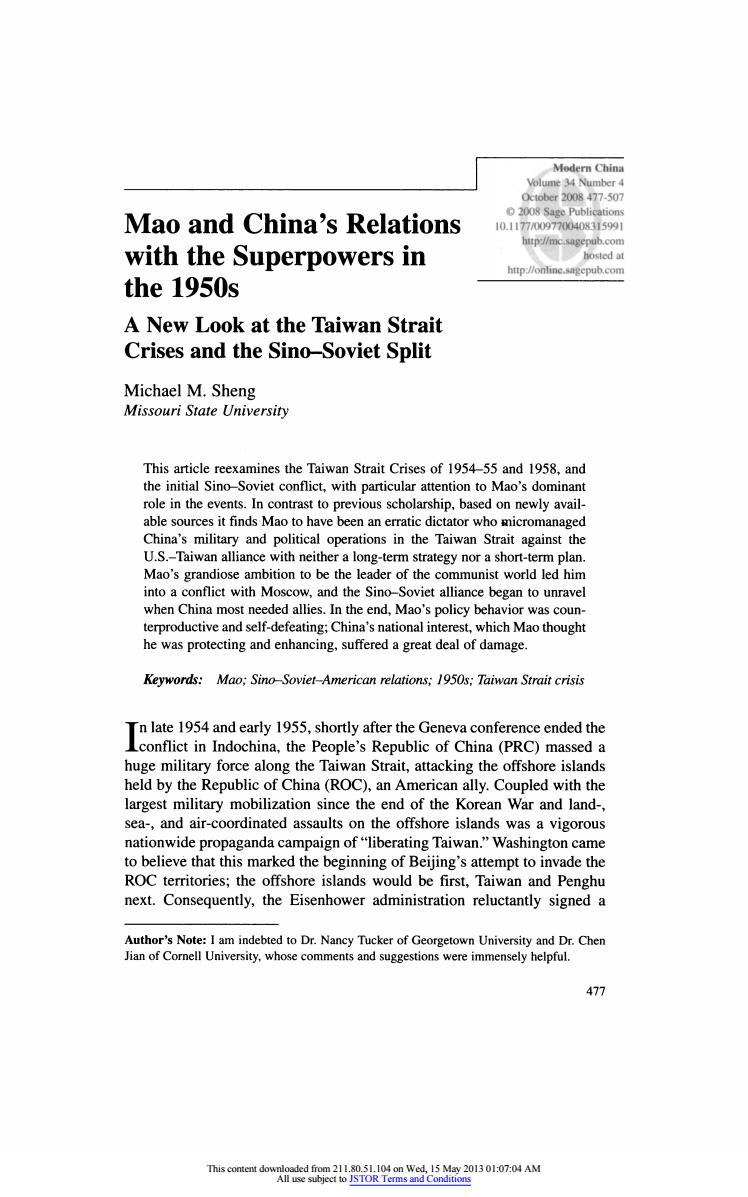正在加载图片...

Modern China Volume 34 Number 4 0 ctober2008477-507 2008 Sage Publications Mao and China's Relations 10.11770097700408315991 http://mc.sagepub.com with the Superpowers in hosted at http://online.sagepub.com the 1950s A New Look at the Taiwan Strait Crises and the Sino-Soviet Split Michael M.Sheng Missouri State University This article reexamines the Taiwan Strait Crises of 1954-55 and 1958,and the initial Sino-Soviet conflict,with particular attention to Mao's dominant role in the events.In contrast to previous scholarship,based on newly avail- able sources it finds Mao to have been an erratic dictator who micromanaged China's military and political operations in the Taiwan Strait against the U.S.-Taiwan alliance with neither a long-term strategy nor a short-term plan. Mao's grandiose ambition to be the leader of the communist world led him into a conflict with Moscow,and the Sino-Soviet alliance began to unravel when China most needed allies.In the end,Mao's policy behavior was coun- terproductive and self-defeating:China's national interest,which Mao thought he was protecting and enhancing,suffered a great deal of damage. Keywords:Mao;Sino-Soviet-American relations;1950s;Taiwan Strait crisis Tn late 1954 and early 1955,shortly after the Geneva conference ended the Lconflict in Indochina,the People's Republic of China(PRC)massed a huge military force along the Taiwan Strait,attacking the offshore islands held by the Republic of China(ROC),an American ally.Coupled with the largest military mobilization since the end of the Korean War and land-, sea-,and air-coordinated assaults on the offshore islands was a vigorous nationwide propaganda campaign of"liberating Taiwan."Washington came to believe that this marked the beginning of Beijing's attempt to invade the ROC territories;the offshore islands would be first,Taiwan and Penghu next.Consequently,the Eisenhower administration reluctantly signed a Author's Note:I am indebted to Dr.Nancy Tucker of Georgetown University and Dr.Chen Jian of Cornell University,whose comments and suggestions were immensely helpful. 477 This content downloaded from 211.80.51.104 on Wed,15 May 2013 01:07:04 AM All use subject to JSTOR Terms and ConditionsMao and China's Relations with the Superpowers in the 1950s A New Look at the Taiwan Strait Crises and the Sino-Soviet Split Michael M. Sheng Missouri State University This article reexamines the Taiwan Strait Crises of 1954-55 and 1958, and the initial Sino-Soviet conflict, with particular attention to Mao's dominant role in the events. In contrast to previous scholarship, based on newly avail able sources it finds Mao to have been an erratic dictator who micromanaged China's military and political operations in the Taiwan Strait against the U.S.-Taiwan alliance with neither a long-term strategy nor a short-term plan. Mao's grandiose ambition to be the leader of the communist world led him into a conflict with Moscow, and the Sino-Soviet alliance began to unravel when China most needed allies. In the end, Mao's policy behavior was coun terproductive and self-defeating; China's national interest, which Mao thought he was protecting and enhancing, suffered a great deal of damage. Keywords: Mao; Sino-Soviet-American relations; 1950s; Taiwan Strait crisis In late 1954 and early 1955, shortly after the Geneva conference ended the conflict in Indochina, the People's Republic of China (PRC) massed a huge military force along the Taiwan Strait, attacking the offshore islands held by the Republic of China (ROC), an American ally. Coupled with the largest military mobilization since the end of the Korean War and land-, sea-, and air-coordinated assaults on the offshore islands was a vigorous nationwide propaganda campaign of "liberating Taiwan." Washington came to believe that this marked the beginning of Beijing's attempt to invade the ROC territories; the offshore islands would be first, Taiwan and Penghu next. Consequently, the Eisenhower administration reluctantly signed a Author's Note: I am indebted to Dr. Nancy Tucker of Georgetown University and Dr. Chen Jian of Cornell University, whose comments and suggestions were immensely helpful. 477 This content downloaded from 211.80.51.104 on Wed, 15 May 2013 01:07:04 AM All use subject to JSTOR Terms and Conditions